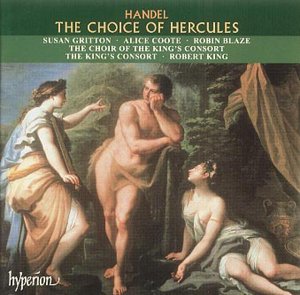The Choice of Hercules
~HWV 69~
|
|
Pleasure: Susan Gritton Virtue: Alice Coote Hercules: Robin Blaze An Attendant on Pleasure: Charles Daniels
The Choir of The King’s Consort Also includes the anthem “Hearken unto me, ye Holy Children” by Maurice Greene.
|
The Choice of Hercules was inserted into Handel’s 1751 revival of Alexander’s Feast. Unlike “Cecilia, volgi un sguardo” (HWV 89), a cantata inserted into the first version of Alexander’s Feast in 1736, The Choice of Hercules has nothing whatsoever to do with the narrative of Alexander’s Feast or its narrator Timotheus. It was instead a way for Handel to recycle some marvellous music that was originally composed as incidental music for Tobias Smollet’s play Alceste. The Alceste project was abandoned, but the music lacks for nothing. Handel was by this time enjoying his Indian Summer, ending his career with masterful creations such as Solomon and Theodora. The score of The Choice of Hercules comes from this apex of Handel’s final artistic peak: its orchestration including flutes and horns is delightful, the arias all notable tuneful, and Handel’s manner of musical storytelling is as compelling as ever.
The 18th century abounds in serenata-like dramas presenting the allegory of a mythological hero having to choose between virtue, glory, and self-gratification. Mozart’s Il Sogno di Scipione (Salzburg, 1772) is one of the most familiar examples of the genre, and it is a dramatic convention frequently deployed in baroque Catholic oratorios such as Handel’s early Il Trionfo del Tempo e del Disinganno (Rome, 1707). Bach’s secular cantata Laßt uns sorgen, laßt uns wachen (BWV 213) also describes Hercules choosing which path will lead him to his destiny.
In Handel’s version the diametrically opposite personifications of Pleasure and Virtue take turns to persuade the young Hercules to follow their creed. The title hero is faced with the unenviable dilemma of needing to spurn beauty and pleasure in favour of virtuous heroism, and laments having to forsake more carefree pursuits in the gorgeous “Yet can I hear the dulcet lay”. This sublime aria, based on the equally perfect soprano aria “Gentle Morpheus” in Alceste, is the English equivalent to Ruggiero’s similar brief moment of regret captured in “Verdi prati” (Alcina, Act II).
Surprisingly, Robert King’s new version is the third recording of this rarely heard gem. Philip Ledger and The English Chamber Orchestra recorded The Choice of Hercules for EMI in the late 1970s (it has never been reissued on CD). The only available competition is an obscure Capriccio disc made in 1984 by Max Pommer and the Neues Bachisches Collegium Musicum Leipzig. This performance is sung in English, and its attractive features include Arleen Augér and some lovely musical playing. The new Hyperion disc makes the strongest case yet for the work’s worth, and is well nigh perfect in almost all respects. Sometimes Robert King’s conducting in Handel lacks enough drive and vigour. For example, the horns in “There the brisk sparkling nectar” are rousing and pleasant to please anyone, but do they really have enough of the arrogant swagger that the score is crying out for? However such a modest approach to Handel’s music is extremely refreshing at times, and King’s tempos and emotional qualities are all adequate and satisfying in this performance.
King’s strongest asset here, as so often in the past, is his virtually faultless choice of singers. Susan Gritton is a reliable Handel oratorio soprano, and her performance as Pleasure is musically accurate but perhaps slightly too short on eroticism. The impressive Alice Coote and mellifluous Charles Daniels are possibly the most perfect English practitioners of their respective voice types, and both execute their arias with musical taste and enthusiasm for their characters. Robin Blaze is simply dazzling: the gentle melismatic lyricism of “Yet can I hear the dulcet lay” is given a heartfelt rendering that is nothing short of breathtaking. This is certainly Blaze’s best singing yet captured for posterity on disc. The Choir of the King’s Consort are slightly less satisfying, sounding too large and uncomfortably like a collection of competing soloists. A refined choral blend would have suited the orchestra’s style of accompaniment better.
The Choice of Hercules is not a long work, so the addition of another work in order to fill the disc is to be applauded. However, King’s choice of Maurice Greene’s anthem “Hearken unto me” is perplexing. On paper, the mixture of Handel’s unabashed secularism with a faintly sanctimonious sacred effort by a less gifted composer makes for an uneven and artistically disjointed experience. It would have made more sense to have included Handel’s “Cecilia un volgi sguardo” (the Alexander’s Feast connection would have been fascinating, and there is currently no available version of this wonderful cantata). It would also have been possible to have recorded a related work by another composer, such as Arne’s enjoyable The Judgement of Paris, in which the Trojan Prince is faced with having to award the golden apple to one of the three goddesses squabbling for his attention.
Yet Greene’s anthem, composed for King’s College Cambridge in the Spring of 1728, proves to be more pleasing than merely being proficient. Fine contributions by Blaze, Daniels, and bass Peter Harvey, make for an enjoyable experience that is in many ways a natural conclusion to King’s highly acclaimed complete exploration of Purcell’s anthems. It is a shame that Hyperion and King did not instead decide to use this anthem as part of a separate anthology of English baroque anthems by Handel’s contemporaries such as Boyce, Stanley, and Croft.
So, despite some minor reservations about the choral contribution, a slightly unconvincing argument for Pleasure, and the questionable addition of Greene’s anthem, this is without doubt one of Robert King’s best achievements and a precious addition to the discography.

